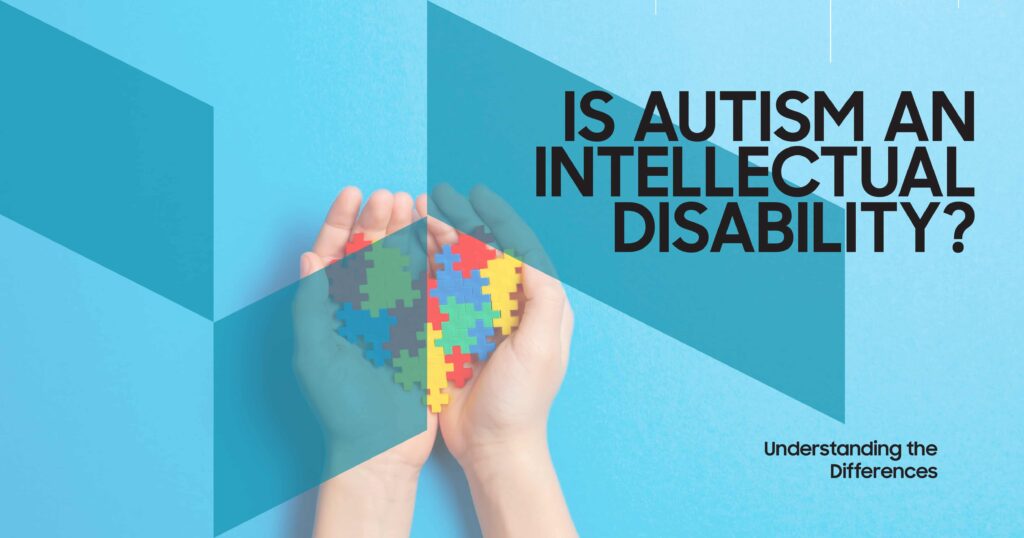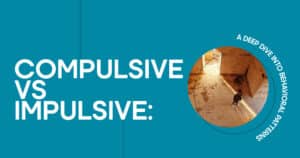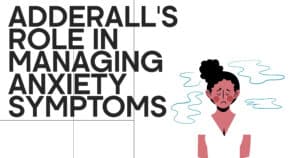The lines between autism and intellectual disabilities are often blurred – people without mental health training might believe autism is a necessary prerequisite for intellectual disability and vice versa. Is autism an intellectual disability? How do intellectual disabilities affect the person’s communication abilities and cognitive function? Do medical professionals diagnose these conditions separately?
In this article we will explore both autism and intellectual disability, learn about the key characteristics of both conditions, and look into effective ways to manage them and ensure a person has a good quality of life.
What Is Autism Spectrum Disorder (ASD)?
Autism spectrum disorder is a developmental brain disorder that typically influences the way a person interacts with others, learns new information, and acts. Typically the first manifestations of autism occur before the individual is three years old. The word “spectrum” means autism comes in different shapes and forms – the signs vary from person to person.
An autistic individual often struggles to express themselves and let others know what they mean, they might have issues at school or college due to learning problems, feel discomfort during a massive change or transition in their life, and feel overstimulated if they are unsettled by certain colors, sounds, or temperature. Autism is not a mental illness – it means the person’s brain works in a unique way when compared to other people their own age, older, or younger.
In some cases, the individual’s social skills can be improved so that they appear non-autistic to others – this is a common strategy that should not be used, however, to suppress your natural instincts.

What Defines an Intellectual Disability (IDD)?
Intellectual or developmental disability (IDD) refers to the presence of specific limitations in the individual’s skills and cognitive functioning – a person may be unable to speak, socialize, or take care of themselves properly. Effects of intellectual disabilities are diverse – some people have minor issues while others have to struggle a lot and require support and assistance throughout their entire lives. Many individuals are able to undergo vocational training as long as they receive educational support – it will allow them to support themselves as they grow older.
A person with intellectual disability is typically diagnosed during childhood or adolescence. They often reach physical development milestones at different ages compared to other kids – they learn to sit up, crawl, or walk later, have issues with talking or begin talking late, cannot feed and dress themselves without much trouble, experience intense emotions by crying and screaming, and fail to connect the consequences of their behavior with specific actions.
How ASD and IDD Affect Cognitive and Social Functioning
Both IDD and autism will impact the person’s ability to interact with other people and process thoughts:
- Lack of interest towards social communication and making new friends.
- Poor development of language and speech skills.
- Inability to interpret social cues or understand the point of view of another person.
- Limited eye contact or lack thereof.
- Severe anxiety whenever there is a change in plans or a routine.
- Poor problem-solving skills and troubles with memorization.
Why the Two Are Often Confused
Is autism an intellectual disability? ASD and IDD are not synonymous terms – still, they are often used interchangeably to refer to a specific behavior. One of the main reasons why autism is closely associated with various intellectual disabilities is the fact that a high percentage of people with ASD are also diagnosed with intellectual disabilities.
Can Someone Have Both Autism and an Intellectual Disability?
Yes, it is possible to have an intellectual disability and autism at the same time. You should not presume an autistic person would also have an intellectual disability or developmental delay. Certain autistic traits and intellectual disability signs will be visible to the person’s inner circle at early stages of life, which helps to diagnose both conditions correctly without further emotional struggle.
Diagnosing ASD and IDD: What Clinicians Look For
Both autism and intellectual disability must be diagnosed by healthcare providers – you cannot simply observe someone’s behavior and come to a conclusion they are on the autism spectrum or they are intellectually disabled. As soon as you notice the symptoms that make the person in question stand out among their peers, you should get a formal diagnosis.
- To make sure a person has an intellectual disability, a clinician needs to confirm the presence of slowed or delayed learning, lack of focus and concentration, inability to take care of themselves independently, and limited capacity to participate in social interactions.
- To confirm autism, a healthcare provider will have to examine the person to understand whether they have issues with socialization, eye contact, and concentration. An individual may be hyper-focused on a particular topic, speak in a monotone voice, or be unable to identify social cues others have no problems with.
When the parents of a child with autism or intellectual disability learn about the diagnosis, they often feel frustrated and hopeless. This should not discourage you from fighting for the happy and healthy future of your kid – they still have aspirations, goals, and plans, especially if their cognitive functioning is not severely affected. You can sign up for support programs and look for local educational services that aim to help autistic people and individuals with intellectual disabilities become the best versions of themselves.
Therapy for Autism and Intellectual Disabilities
Even though intellectual disability, just like autism, cannot be fully cured, there are treatment and management methods that will ensure a patient leads a fulfilling life and does not feel limited by their mental abilities:
| Form of Therapy | Description |
Behavioral Management Therapy | This type of therapy is recommended for people with autism and intellectual disabilities if they are hyperfixated on unwanted behaviors and other therapy modalities did not eliminate these problems. Desirable actions will be reinforced while problematic behaviors such as aggression, screaming, or desire to self-harm can be properly dealt with |
Cognitive Behavioral Therapy (CBT) | CBT is often required to enhance the patient’s memory, attention, ability to solve problems, and capacity to make the right decisions. This evidence-based therapy modality is meant to help the person develop critical thinking and address existing cognitive distortions |
Family Counseling | Parents of intellectually disabled children – no matter how old they are – can benefit from therapy that gives them solutions for problems they have experienced and will experience in the future. If your family member has a mild intellectual disability, you can attend therapy sessions together and strengthen your bond |
Medication Management | Despite the fact that neither autism nor intellectual disabilities can be treated with prescription drugs, patients often exhibit the symptoms of various mental health conditions, such as anxiety or attention-deficit/hyperactivity disorder (ADHD). The quality of an individual’s life can be improved with carefully selected medication |
When to Seek Help: Contact CA Mental Health
If you are autistic and wondering if psychotherapy is worth your time, the answer is yes. Whether autism causes you issues on its own or there are additional struggles in your life that make you anxious or depressed, you should follow the guidance of a mental health professional who will dissuade your fears and help you to express your emotions in a constructive manner.

Reach out to CA Mental Health today – our team can support you during a challenging time in your life and make you more resilient and focused.
FAQs
Is autism considered an intellectual disability?
Autism is not an intellectual disability. Nevertheless, both can exist together in a person, and some studies even show that intellectual disabilities and autism are caused by the same genes.
What is the difference between autism and intellectual disability?
While autism affects the person’s communication with others and causes social problems, intellectual disabilities will result in developmental delays – an individual cannot plan and solve problems, think using logic, take care of their hygiene, or respect social boundaries. Intellectual disability usually means low IQ while it is not always the case with autistic people.
Can someone have both autism and an intellectual disability?
Many people have ASD and intellectual disability whether the latter was caused by illness, injury, or a problem with the person’s brain. While intellectual disability is often associated with the inability to speak or adjust to new situations, it should not suggest the person is also on the autism spectrum.
What are common challenges for autistic individuals?
Although autism is not a mental illness or intellectual disability, the autistic person’s mental health is often in danger, especially when they are not taught coping mechanisms to address their problems on their own. They have to deal with aggressiveness and intolerance of other people when they find out about autism, cope with anxiety and stress, feel overwhelmed due to sensory differences, and struggle with overthinking and learning difficulties.
How can therapy help those with autism and IDD?
A therapist qualified to work with autistic people and individuals with intellectual disabilities can make a real difference in their patients’ lives – they will resolve speech and language impairments, focus on communication skills, and explore healthy coping mechanisms to manage maladaptive behaviors.












